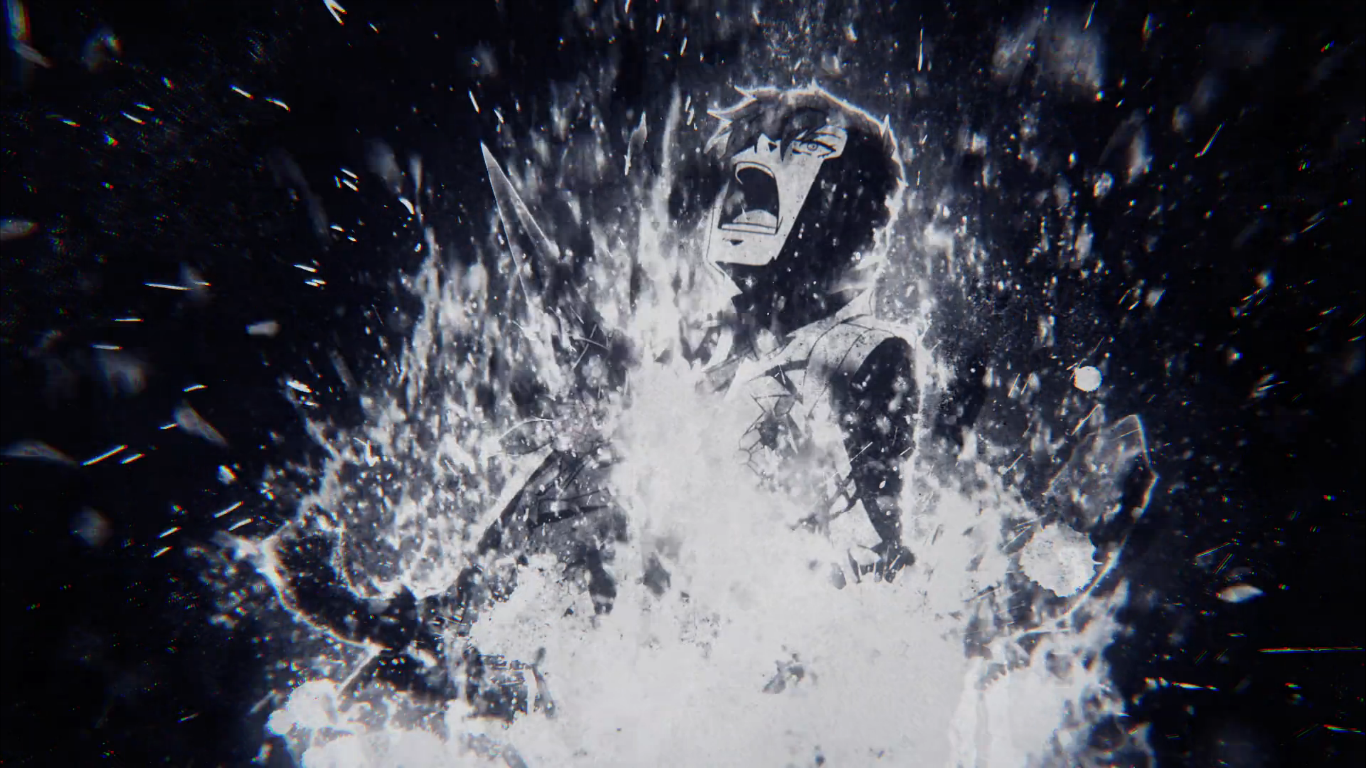
I've been fairly excited for the release of Caligula, not because I've played the game, (I lack a PS Vita) but because reading the premise online had me really interested. I can imagine those who watch the anime blind won't have any idea what this anime is about based on the first episode alone, so I'll tell you what I know about the game's story first, and why it has me excited. Bear in mind, having not played the game and with this episode being fairly obscure I'm likely to get a few details wrong.
A virtual idol named μ (or Mu) has absorbed the emotions of her fans, and through those emotions has gained a sort of awareness. This awareness has led her to believe that her fans would be happier if they lived in a virtual world known as Mobius (Very direct Matrix reference, there) where the citizens live out an idyllic Japanese highschool life on a loop. As such, our main character Ritsu and a group of other people form the 'Going Home Club' to try and return to the real world. As for why students are turning into monsters, right now I have no idea.
The reason the premise had me excited is because this is exactly the kind of story that I would likely be interested in writing myself. I've always felt that Vocaloids and Virtual celebrities such as Hatsune Miku and Kizuna Ai had great potential for anime styled narratives, and I've toyed with similar ideas to Caligula in the past, but none so pure as this. So it feels cathartic to see my half-baked ideas refined into an actual anime I can watch. The reason these ideas fascinate me is because these questions regarding reality and fiction, over what reality is even going to mean going forward into the future and whether or not these false realities will eventually become preferable to our current lives feel like questions that have been at the heart of anime ever since its conception. And especially since Neon Genesis Evangelion over two decades ago. Many young people are turning away from the reality across the world, and Japanese NEETs and Otaku feel almost emblematic of this new social phenomenon. People would rather grow up watching the same kinds of stories about adorable highschoolers doing practically anything and everything, trying to keep their teenage youth in a sort of perpetual stasis. This was happening long before Caligula decided to make what everyone has long known into a very on-the nose premise.
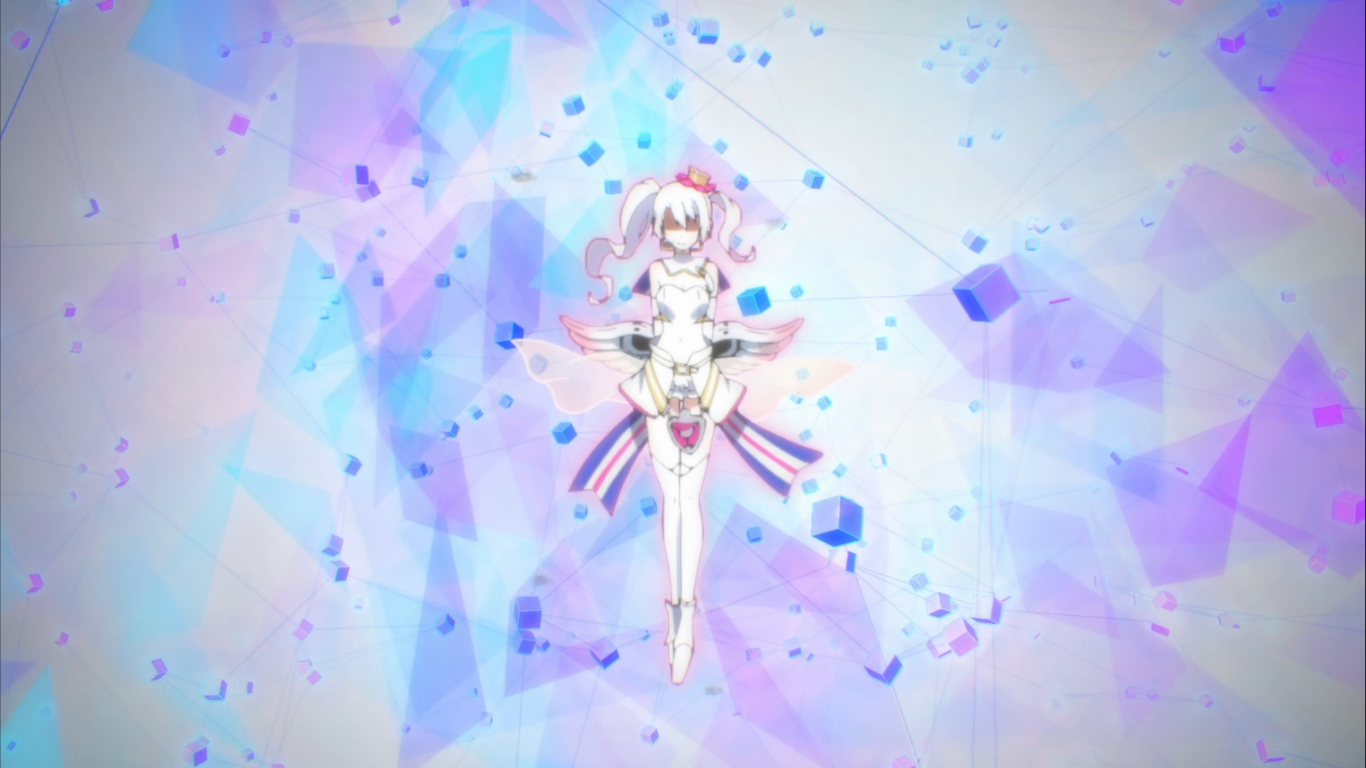
So if the sentiments behind the premise aren't particularly original, then why does it interest me? I think it's because the best anime tend to be the ones that directly reject the genre trappings Otaku culture has built around itself for decades now. The Evangelions and the Welcome to the NHKs of the world aren't just good anime, they're the ones that speak to the very reasons why Otaku even watch anime in the first place. Otaku punish themselves constantly, every reminder that they're unable to face society only pushing them further back into their own shells. Think about how so many of the biggest media industries today, not just in Japan but in Hollywood as well, have a business model that rely on pandering to people's nostalgia, by adapting old stories from the pre-2000s and remaking films, or how anime has solidified itself into a select few genres that are defined heavily by their aesthetics. How Mecha, Shonen, Magical Girl, and Slice of Life have become more common descriptors for anime than Horror, Comedy, and Romance, descriptors which let the viewer know what kind of emotional reaction the work is trying to elicit from them. The most popular media outlets would rather keep selling people the kind of stuff that they already want, the stuff that validates their own life choices, and original works that the artists created out of their own passions are becoming less common place. Or maybe that's the way things have always been.
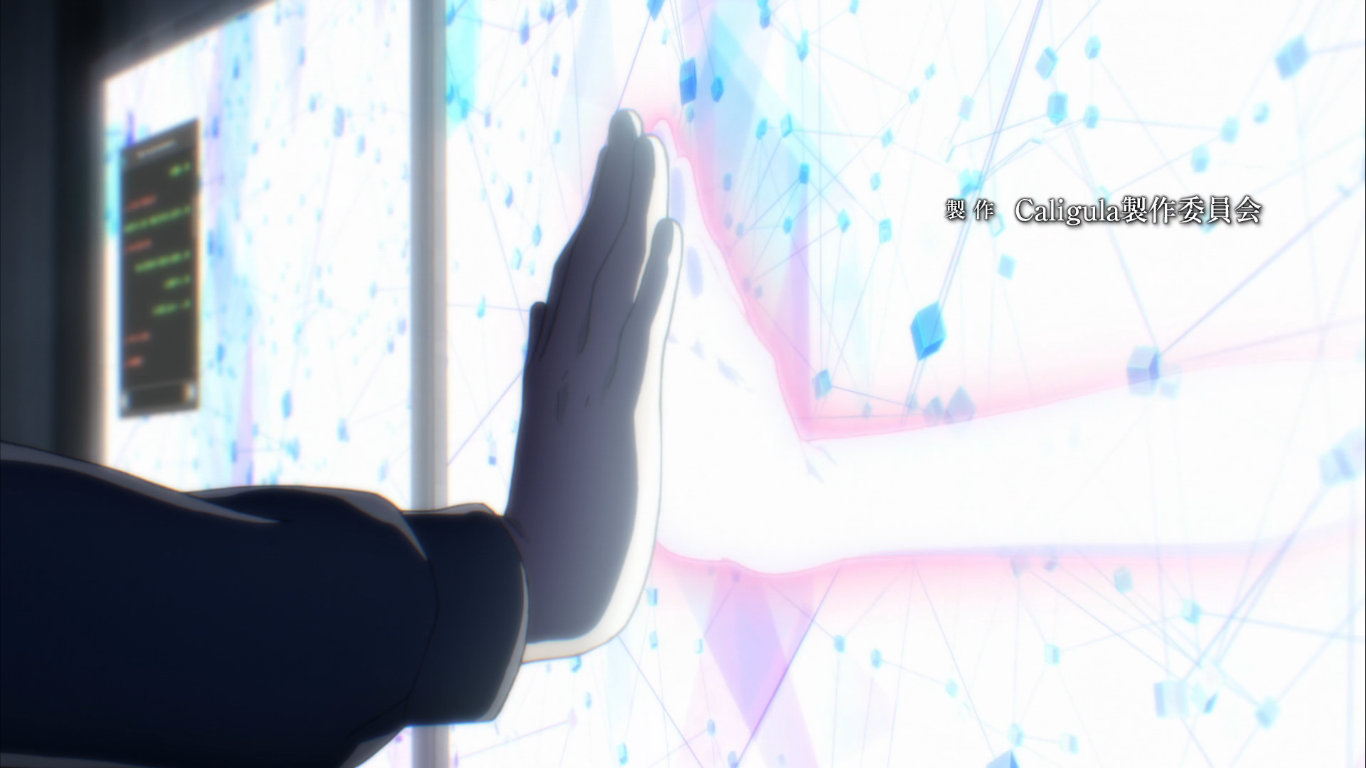
Maybe I went a bit beyond the scope of what Caligula is attempting to achieve here. But I can't help but feel like the premise alone expresses a lot of bitterness towards the current state of things. Though of course, the problem with this type of premise is that it allows itself an excuse to remain in a safe genre space rather than doing something new. If it's criticising itself, it has the excuse to be yet another high-school action series with all the genre trappings expected of an anime, so it can market itself without alienating their core demographic, because it looks just like anything else. And it's not like even the most common denominator shows are lacking in self awareness, a lot of anime comedy comes from pointing out the same genre gags that we've been living with for decades now.
Otaku culture pokes fun at itself, it's a trope in and of itself now. We're niche and lots of people still seem to think all anime is weird tentacle porn for paedophiles, and reject any given anime based on the art style alone. For as popular as anime is online, we're still a niche culture all things considered, growing at a very slow pace. We punish ourselves for liking something that society seems to think is lame, and that sense of self-loathing is expressed on the screen by fans who grow up to make anime and manga and video games of their own. That's why I feel that these kinds of shows that criticise anime and its fandom tend to be the best anime out there.
Because they're the most honest.
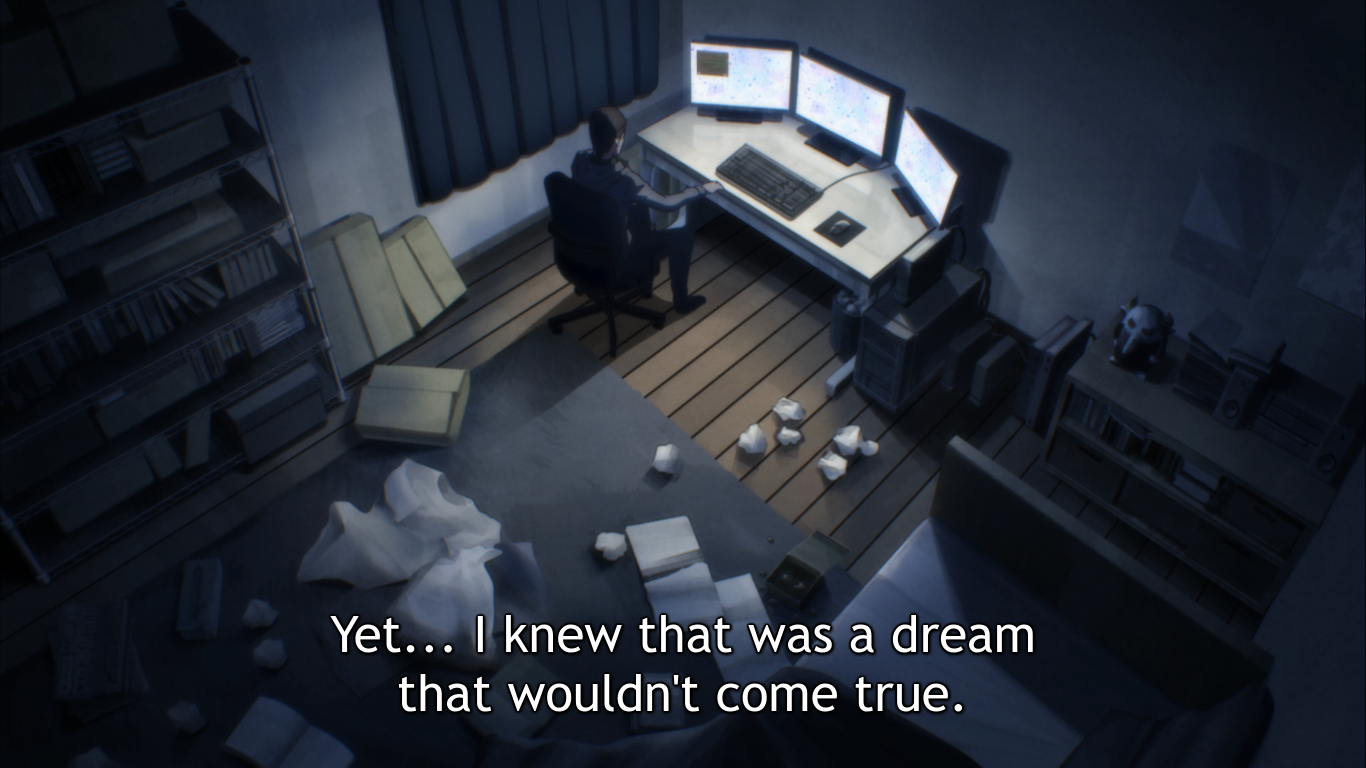
Caligula's first episode makes me pretty hopeful regarding things to come. There's some excellent lines here, as well as some wonderfully directed sequences conveying a sense of unease and mystery, and a couple still shots that I thought looked really good. Considering this is a game adaption, I was expecting a lot of exposition to be front loaded into the first episode, but I can imagine someone watching this blind still being completely unaware of what's going on or what's going to happen next whilst still remaining engaged. The show conveys a sense of unease, that something isn't quite right, mostly using the direction. But the writing also helps in some regard. Such as how all the media we see in this world seems to be related to Mu, how even the news is reporting on her latest concerts, and how everybody just seems to be enamoured with her songs. And those songs are really good, too, diagetically introduced into the narrative through people listening to her on their computers or their phone, or the concert at the end of the episode. We learn very little about Mu in this episode, in fact outside of her songs I don't think she has a single speaking line, but just the lyrics in the songs themselves convey the sense that the first person perspective she's singing from doesn't reflect herself, but the feelings of her fans which she was merely conveying. I was definitely paying much more attention to her music during the final minutes of the episode than I was to the students turning into monsters.
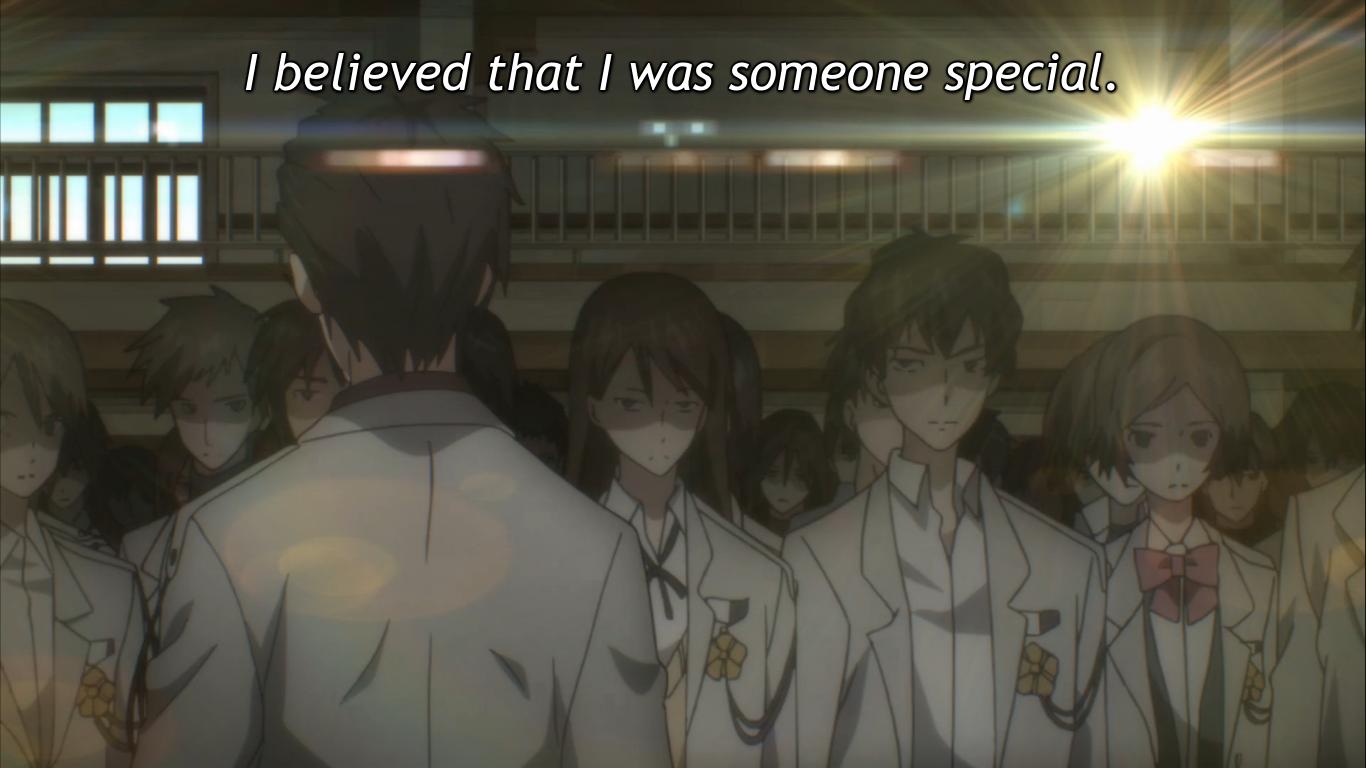
The writing isn't perfect however. Ritsu is a pretty thoughtful boy, and he loves referencing real philosophers and explaining psychological concepts in great depth. These psychology lectures had me interested initially because I felt it strengthened the idea that the show knew what it was doing. Specifically, the way Ritsu seemed to focus on the subconscious, or 'hidden' side to the self seemed to reflect the idea that many of the emotions expressed through Mu's songs might also be ones that he subconsciously feels about himself. In fact, it's likely that everybody in Mobius is hiding these emotions away from themselves and others, and trying to ignore the reality that they're living in a dream world.
But a lot of Ritu's dialogue and internal monologue is, unfortunately, dominated by these psychology lectures, and it gets wordy enough that I wished that the show had given itself a bit more room to breathe. I'd have probably even preferred a bit more exposition or, better yet, character banter. Because thankfully, Ritsu's friends seemed to agree with the audience that Ritsu may need to chill a bit, and the way they bounced off of him was pretty enjoyable.
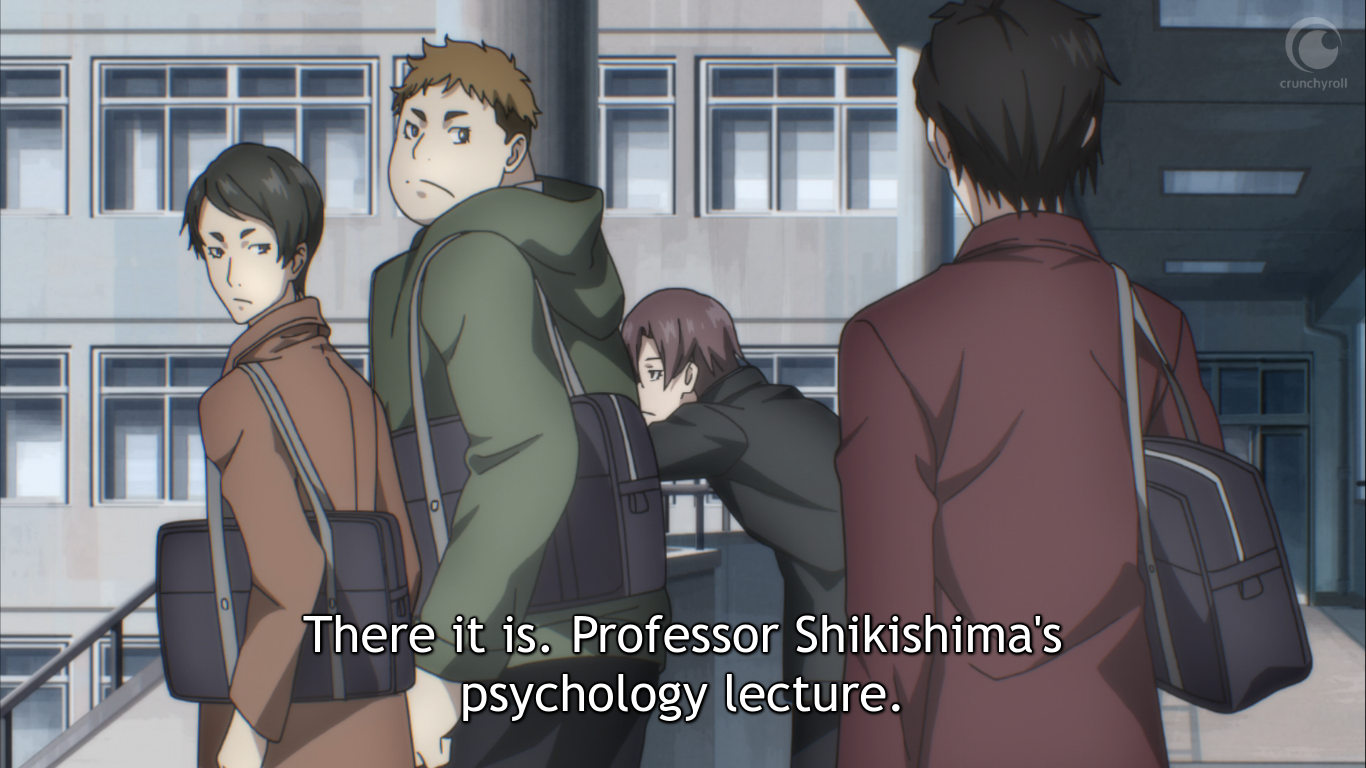
In any case, this show has me pretty excited. And from the looks of things, Caligula is getting a remake on PS4. No western release announced yet, but hopefully I'll get a chance to play the game someday! I hear the game had some gameplay issues, which hopefully a console remake could fix, but until then here's to hoping that the anime won't go the way of most JRPG anime adaptions.
I'm planning on watching the Persona 5 anime and the Sword Art Online anime (God help me) in the next day or so, and hopefully I'll have posts out on one or both of those before the next week of anime starts, where I'm mostly looking forward to Steins;Gate 0.
Until then, be sure to upvote, comment, and follow if you enjoy these posts, as they encourage me to keep going. It's getting a bit lonely, talking to myself.
